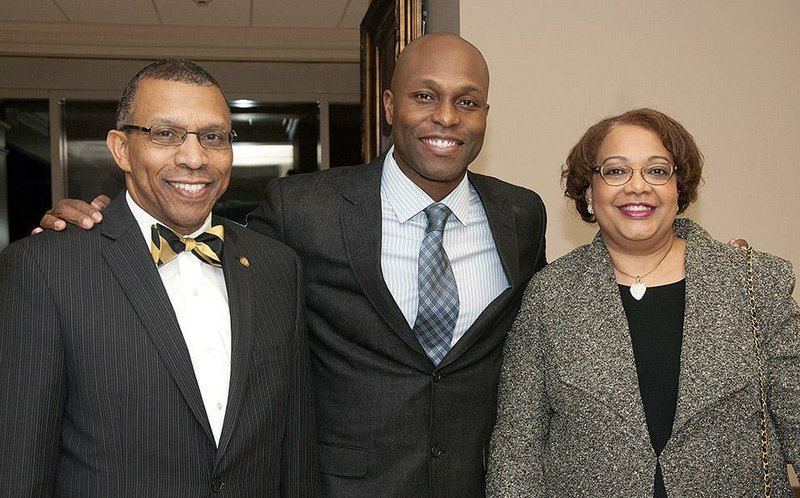PINE BLUFF -- The director of the University of Arkansas at Pine Bluff's Aquaculture and Fisheries Center is questioning the program's future after nearly two years of disagreements with UAPB Chancellor Laurence Alexander over how to run it.
Alexander, who took the helm at UAPB in 2013, said he is trying to get the program's goals more in line with his overall vision for the university. That includes more focus on new research.
A movement is also underway by the UAPB National Advisory Committee on Aquaculture to place the aquaculture and fisheries' administrative division under the auspices of the University of Arkansas Division of Agriculture. That would mean that UAPB would no longer have control over how the program is operated.
University of Arkansas System President Donald Bobbitt said in an emailed statement that such a move will never happen, however.
"The program originated at UAPB and will remain at UAPB," Bobbitt wrote.
"I have asked Dr. Alexander to review the program and staffing to determine whether any changes may need to be made so that the program continues to meet the needs of the aquaculture industry, as well as the academic pursuits vital to a land grant university. As is true with all academic programs, responsibility for management and governance rests with the Chancellor and myself, and ultimately with the UA Board of Trustees."
The national advisory committee, which operates independently of the university, is to discuss the issue at a noon meeting Tuesday at UAPB.
Alexander called the program "one of our signature programs at UAPB, one that puts us at the head of the class in this category across the nation. Frankly, it takes us aback that there is some interest that would like to take this program outside the control of the institution that has nursed and made it what it is today."
Arkansas is the second-largest producer of aquaculture products in the United States, behind Mississippi. Farmers and wildlife experts from around the world ship fish into the UAPB center's fish pathology unit to identify diseases and halt their spread.
Aquaculture and fisheries Director Carole Engle said Alexander is "straying away" from the program's core, and Engle is afraid that such a divergence will prove damaging.
"First and foremost, we must address the issues of our stakeholders as required by the United States Department of Agriculture," Engle said. "And it's very painful for me to say this, but I think our program is in the initial stages of collapsing. We have four faculty members who are looking to leave, and I am as well."
Bobbitt said in his email that he disagrees "strongly with the disingenuous characterization that the aquaculture program at UAPB is on the verge of 'imminent collapse.' Chancellor Alexander is keenly aware of concerns expressed by some in the aquaculture industry, and he has been diligent in meeting with program faculty and staff, leaders in the aquaculture industry and others to discuss these concerns."
As a land-grant university, UAPB receives millions of dollars in funding each year from the USDA and must follow certain guidelines to qualify for the money. Those include basic and applied research.
Engle said her department receives about $1 million annually from the USDA.
One requirement for receiving federal dollars is seeking input and working with local aquaculture growers, who are known as stakeholders, Engle said. The UAPB National Advisory Committee on Aquaculture consists of those who have vested interests in the field, and provide counseling and advice to the program.
Mike Freeze, a Lonoke County fish farmer, is the committee's vice chairman and is leading the effort to move the administrative division under the umbrella of the University of Arkansas Division of Agriculture.
Freeze said the change would allow the program to be run more effectively.
"Chancellor Alexander wants to go in a different direction with the research," Freeze said. "Instead of conducting stakeholder-driven research, he wants to do cutting-edge technological research. We are concerned about that because of UAPB's requirements to meet certain obligations in order to continue receiving federal funding."
Alexander said the program should be focusing more on new research while continuing to serve the needs of the state's aquaculture industry through proven research methods. He said he hasn't proposed straying from the stakeholders' needs, but rather is working to get the program closer in line with the university's research mission.
"These research methods I am proposing allow faculty to broaden their research perspectives," Alexander said. "Requiring a faculty only to do one type of research goes against academic freedom. I think it's a sad commentary and unfortunate if [some faculty] members feel that because the university is following its mission of teaching and research, they would rather leave than allow the unit to expand."
Engle said focusing too much on new research would place her and other faculty members in a bind.
"If we spend time doing new research, then we are not accountable to the guidelines of USDA funding," Engle said. "And this puts me in a very difficult position. There is a real conflict between the USDA requirements and what UAPB wants to do."
Alexander said both can and should be done effectively to maintain UAPB's mission.
"The types of research we should be doing can really enhance the economic development of this area," Alexander said.
"I think that some people have been limited in their interpretation of that charge from the federal government. We want to maintain what we have been doing, but we need to include new, basic research into our platform, as well.
"If [the aquaculture and fisheries faculty members] are committed to this program, this will blow over and enhance the aquaculture and fisheries program, along with the university," he said.
Metro on 01/25/2015
